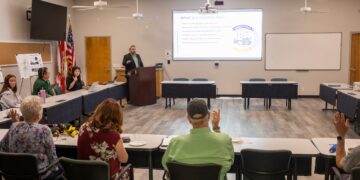The Southwest Florida thrift stores run by St. Matthew’s House offer much more than unique finds and good deals. But many of the shoppers who visit them don’t realize quite how significant an impact they make.
The Naples-based nonprofit that offers services and programs for people struggling with drug and alcohol addiction, homelessness and food insecurity started in the social enterprise space with just one thrift store. Similar to other charitable organizations out there, St. Matthew’s House collected donated goods from members of the community and set up a retail environment in which it could sell those goods and return the profits to its mission. But that was just the beginning.
St. Matthew’s House now has seven thrift stores, with the newest opening recently in Golden Gate. And the success of its stores inspired the nonprofit to expand into other social enterprise businesses—catering operation Delicious by Design, full-service restaurant LuLu’s Kitchen and Port LaBelle Inn and Conference Center.
Operating all of these businesses provides multiple benefits to St. Matthew’s House, from increasing the quality and efficiencies of its feeding ministry to providing ways for its program participants to receive job training and develop career skills. It also allows the nonprofit to make an attention-grabbing statement to its existing and potential donors: that 100% of its administrative expenses are covered by the revenue from its social enterprise businesses, which brought in more than $8.5 million in revenue in 2020, about half of the nonprofit’s operating revenue, according to its annual report.
“It does address that common point when donors are looking at donating to a nonprofit of, ‘Are my donation dollars just going to overhead?’” says Steve Brooder, CEO of St. Matthew’s House. “In our case, we can say no, they aren’t, because of our social enterprises … That really impresses donors, in particular people in business, who can see that we’re operating solid businesses that are sustainable and scalable and really have that type of return to the mission.”

Support Through Shopping
Mike Duke first learned about St. Matthew’s House during a presentation at his Naples church back in 2014. He and his wife arranged a tour to learn more about the organization. That led to them becoming volunteers and then donors, and Duke joined the St. Matthew’s House board in 2020.
The former Walmart CEO could see that the nonprofit was taking a different approach from his initial visit to the thrift store on Airport-Pulling Road in Naples. “I spent my whole working career in the retail industry, and I was really impressed with the professionalism, the cleanliness, the organization and the merchandising,” he says. “It was not like other thrift stores. It was really, really well run, and we could see that from the very first tour.
“Then as I got to know more and realized the scope of the social enterprise operations at St. Matthew’s House, I was even more impressed,” he continues. “The revenue that covers the administrative costs provides them the opportunity for 100% of the contributed dollars to go directly to the programs helping people that are impacted by homelessness, hunger and addiction issues.”
Jamie Shedden recently retired after serving as director of retail operations for St. Matthew’s House. He began working at the nonprofit in 2005 as a store manager, and in his director role, he strove to create enjoyable and attractive places to shop. “When you walk into our stores, you don’t see rows of couches or rows of dressers; you see well-thought-out merchandise in little rooms that allow us to put more product within that square footage,” he says. “The stores are going to smell nice, look nice and be well merchandised, with music playing in-store for [shoppers] to enjoy.”
To make the most of the stores’ limited square footage, Shedden and his team worked to turn product quickly. A storage bay holds items that are priced and ready to be put out for shoppers.
“When something sells on the floor, the employees know they’ve got about 30 minutes to get the item off the floor and over into the ‘sold’ warehouse and get some new items on the floor,” says Shedden. “Customers learn that it doesn’t matter what time of day they come to our stores to shop, they’re going to find a lot of great merchandise.”
Those efforts have paid off, with the St. Matthew’s House thrift stores performing well above national sales averages in dollars earned per square foot. “I think the stores are probably the most significant entry point to the mission that there is,” says Shedden.
But now it’s not the only one, as catering operation Delicious by Design became the second social enterprise business for St. Matthew’s House. “We were serving meals to the homeless and eventually to our recovery program folks, and the quality wasn’t great,” says Brooder. “The idea was, if we start a catering company and can hire a chef, we can improve the quality of food we serve to the folks in our mission.”
Delicious by Design has landed some big gigs over the years, including serving as the main food vendor for the Minto US OPEN Pickleball Championships at East Naples Community Park. “We are planning on having them back in 2023,” says Chris Evon, co-founder of the Minto US OPEN Pickleball Championships. “People love the food and the food choices. But the biggest thing is they are able to serve a large number of people quickly—we have 2,800 athletes and over 35,000 people coming through the park throughout the week.”
Delicious by Design also caters the VIP area of Cars on 5th in Naples, an annual event that supports St. Matthew’s House and raised $1.25 million for the nonprofit in 2022. “They bring an elegance to their small canapes that you wouldn’t just find anywhere else,” says Dennis Flint, who serves as vice president of the Naples Chapter of the Ferrari Club of America and regional director of the Ferrari Club of America for Florida, and is also a board member and donor at St. Matthew’s House. “Anyone can cook a hamburger, but they do a really great job.”

Job Training and Career Opportunities
St. Matthew’s House next purchased the Port LaBelle Inn and Conference Center in LaBelle, which can host retreats and conferences. In 2016, the St. Matthew’s House Car Wash and Detail Center opened near the flagship Naples thrift store.
Since 2020, the catering business has been operating out of a new 8,000-square-foot facility called LuLu’s Kitchen, which is also home to a restaurant that’s open to the public, serving breakfast and lunch five days a week. The St. Matthew’s House culinary training program is run out of the facility, and all of the hot meals served on the nonprofit’s campuses are made there, as well.
The culinary operations provide food services for both St. Matthew’s House itself and the general public. They also play a vital role in the organization’s efforts to help the people it serves in both the short and long term.
“They offer multiple opportunities for residents of our shelter program and the men and women in our recovery program to learn job skills, life skills and reentry skills into society,” says Liz Morris, director of hospitality at St. Matthew’s House. “They can earn a paycheck, help out the mission and get some really solid job placement on their resumes, so they can go back out to the open market to compete for really great jobs.”
That’s good for the folks who go through the programs offered at St. Matthew’s House, and good for other local businesses in need of employees. But some people stick around for the long haul. Brooder estimates that about 40% of the workforce in the social enterprise businesses run by St. Matthew’s House are people who went through the shelter or recovery programs. And the fact that the businesses offer safe, sober workplaces makes them especially appealing.
“Our social enterprise model helps our graduates and shelter program participants actually obtain full-time, permanent employment,” says Ray Steadman, vice president of programs at St. Matthew’s House. “It gives them the opportunity to work in a healthy environment where there aren’t the triggers that they would see on the outside. And they can work in an environment that is just as competitive as if they worked at a chain restaurant or a popular local restaurant.”

An Increasing Need
Hurricane Ian caused damage to several of the St. Matthew’s House properties. Its thrift store in Fort Myers and two buildings used for residential care sustained the most severe damage.
The nonprofit has been providing mobile food distributions to the public since the beginning of the pandemic and serves fresh, hot meals each day to those in need. Following the hurricane, it supplemented its regular food distributions with smaller, community-based pop-up distributions and saw a definite uptick in the number of people coming in for those daily hot meals.
St. Matthew’s House already had a wait list for all residential programs before Hurricane Ian. And now the need is only going to grow.
“The challenge in Collier County and Southwest Florida before Hurricane Ian was affordable housing,” says Steadman. “Ian has compounded Collier County’s affordable housing crisis by damaging some of the areas of affordability in record numbers. East Naples neighborhoods with older homes and moderate- to low-income families were devastated by rising storm waters damaging their houses and personal belongings. These individuals have now been displaced with few prospects for housing. We will be working with community leaders and county officials for long-term affordable solutions.”
Support for the organization’s mission is more crucial than ever right now, and because of its social enterprise businesses, all donated dollars will flow right back into the local community. Area residents also can support St. Matthew’s House by volunteering or donating furniture, food and clothing.
“Hurricane Ian has created a significantly larger number of neighbors and friends who are experiencing crisis, which will place a strain on our capacity and resources,” says Steadman. “In the early days after the storm, we already began to feel the pressure being placed on our capacity, with increased needs from hungry neighbors and calls for more residential space from those displaced from the storm.”
Beyond Traditional Philanthropy
Sarah Owen, CEO of Collaboratory in Fort Myers (formerly the Southwest Florida Community Foundation), has seen how the nonprofit sector struggles with the issue of overhead costs versus donation dollars.
“They don’t have, sometimes, the mindset of ‘How do we build revenue,’ and that has been created by the whole ‘overhead myth,’ where 99 cents of every dollar has to go to programmatic expenses and not operations,” she says. “I believe that St. Matthew’s House has been on the cutting edge of this. It’s been using social enterprise programmatic thinking to offset its operating costs for a long time, and has just continued to expand it.”
The Collaboratory is helping other local nonprofits take a similar approach through the impact investing fund that it runs in partnership with Gingras Global, through which it invests in social enterprises that aren’t ready for traditional bank funding. “Impact investing attracts donors who love that angel investing space, but they want to do it for social good,” says Owen. “It really opens up this ability for nonprofits like St. Matthew’s House to have a place to go to get the startup capital in order to do these kinds of programs.”
Owen sees these types of endeavors as a way to address complex community problems that aren’t necessarily being solved by traditional charitable methods. “If we create a system where nonprofits can become self-sustaining, then it diversifies philanthropic dollars in new and significant ways,” she says. “St. Matthew’s House is such a beautiful example of taking a part of its mission and training people for careers that they can walk out of the organization with. It changes their lives generationally. And St. Matthew’s House didn’t just pop up with the idea to earn money, but it said ‘How do we take what we do, the problems we’re trying to solve and the lives we’re trying to help create, and how do we look at our own model and design something like this within it?’”
Other nonprofits may have opportunities to do something similar. “It’s really best when there is alignment with the mission,” says Sheryl Soukup, president of Naples-based Soukup Strategic Solutions, which provides fundraising and management expertise to nonprofits. “In the case of St. Matthew’s House, you can readily see how having these social enterprise activities helps it to fulfill its core mission.”
Social enterprise businesses where customers can make purchases of various kinds can also attract folks who might not have made a monetary donation to a nonprofit otherwise. “It gives them an opportunity to support that nonprofit and they can feel good about that, even though they’re looking to get something,” says Soukup.
“Some people know us by our thrift stores, some by our shelter programs or food assistance,” says Brooder. “With more stores, there’s more exposure in the marketplace so people get to know St. Matthew’s House … We often say it’s hard to communicate the breadth and scale of the organization when we do so many things and impact so many people.”
Nonprofits should do their due diligence to make sure a social enterprise business is the right move for them. Social enterprise businesses face the same kinds of challenges as other local companies these days, from the difficulties of finding employees to the high cost of real estate. Donors have helped St. Matthew’s House deal with some of these challenges; LuLu’s Kitchen, for example, was made possible by a gift from the Holecek Family Foundation.
“Nonprofits do need to think about whether or not they have the capacity to take something on that’s a whole other business,” says Soukup. “If they are starting it because it’s kind of growing and evolving out of something they’re already doing, it makes it a lot easier.”
St. Matthew’s House hears frequently from other nonprofits looking to start social enterprise businesses, and it’s always willing to answer questions and provide tours. It’s also on the lookout for new opportunities for itself.
“We have this proven social enterprise model, and we’re looking to expand it,” says Brooder. “We want to be able to serve more people, and we can only do that through donations and from our social enterprise operations. If we grow those, we can grow the program side.”





